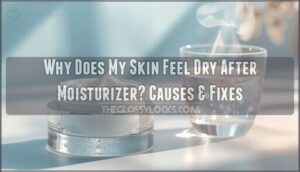This site is supported by our readers. We may earn a commission, at no cost to you, if you purchase through links.

Cold weather strips moisture from your skin’s surface, while hot showers damage its protective barrier. Your morning coffee and evening glass of wine pull water from your cells. Even certain medications and health conditions like diabetes quietly interfere with your skin’s ability to hold onto hydration.
Understanding these factors helps you protect your skin’s moisture before damage becomes visible.
Table Of Contents
- Key Takeaways
- What Causes Poor Skin Hydration?
- Environmental Factors Impacting Skin Hydration
- Lifestyle Habits That Dehydrate Skin
- Medical Conditions Linked to Dehydrated Skin
- Recognizing and Managing Dehydrated Skin
- Frequently Asked Questions (FAQs)
- What causes a dehydrated face?
- Why is hydration important in skincare?
- What is dehydrated skin?
- Can a skin type get dehydrated?
- What causes dehydration & skin imbalances?
- What causes dehydrated skin if you live in a hot climate?
- Can medications cause dehydrated skin?
- How does aging affect skin hydration?
- Does hard water worsen skin dehydration?
- Can stress lead to dehydrated skin?
- Conclusion
Key Takeaways
- Your skin loses water through environmental damage (cold weather, UV rays, low humidity), harsh products (hot showers, alcohol-based toners, sulfates), and lifestyle choices (caffeine, alcohol, poor sleep), not just from drinking too little water.
- Dehydrated skin is a temporary water shortage that affects any skin type, while dry skin is a permanent condition caused by insufficient natural oils—understanding this difference helps you treat the actual problem.
- Medical conditions like diabetes, thyroid disorders, and kidney disease disrupt your skin’s ability to retain moisture from the inside, often requiring professional treatment beyond regular moisturizers.
- You can restore hydration by drinking more water, using products with hyaluronic acid and ceramides, avoiding harsh cleansers, and protecting your skin from sun damage and extreme temperatures.
What Causes Poor Skin Hydration?
Your skin can lose hydration for reasons that aren’t always obvious. Some causes relate to what’s missing in your skin’s natural barrier, while others stem from your daily habits or the world around you.
Here’s what causes your skin to lose moisture.
Difference Between Dry and Dehydrated Skin
Before you assume dry skin and dehydrated skin are the same, know this: they’re not. Dry skin is a skin type you’re born with—a permanent condition caused by lipid deficiency that disrupts your barrier function. Dehydrated skin is a temporary condition triggered by low water content in your outer skin layer.
Here’s how they differ:
- Dry skin lacks natural oils, leading to flakiness and chronic tightness
- Dehydrated skin lacks water, causing dullness and fine lines that fade with hydration
- Skin hydration needs both water and oils—dehydration symptoms can hit any skin type
Understanding this difference helps you treat the real problem. Those with dry skin should consider using moisturizers rich in emollients.
Role of Natural Oils and Moisture Retention
Your skin’s natural oils don’t just sit on the surface—they form a protective barrier that locks water inside and keeps irritants out. This lipid barrier is made of sebum production and ceramides that act as natural moisturizers.
When your oil composition is balanced, you get better moisture retention and skin elasticity. But when sebum runs low, your barrier weakens—leading to dry skin that needs treatment through a targeted skin care routine with hydration tips that restore those oil benefits.
Internal Vs. External Causes
Your skin’s hydration struggles come from two directions at once. Inside, your body’s water levels and conditions like diabetes or thyroid issues set the foundation, while outside forces—weather shifts, harsh soaps, and that extra cup of coffee—chip away at what’s left.
External factors include weather, product impact from harsh cleansers, and lifestyle choices like caffeine consumption.
What you see on your skin is the result of internal dehydration meeting external wear and tear. Real improvement means tackling both problems at once.
Environmental Factors Impacting Skin Hydration
Your skin constantly interacts with everything around it. Dry winter air, harsh summer sun, even that office AC—all of them pull moisture right out of your skin.
Here’s what pulls moisture from your skin and leaves it feeling tight and dry.
Effects of Low Humidity and Weather Changes
When humidity drops, the air around you becomes a thirsty sponge—pulling moisture straight out of your skin’s protective layers. Winter dryness is a textbook example: cold air holds less water vapor, and indoor heating compounds the problem.
These seasonal skin changes trigger increased TEWL, causing dehydration symptoms like itching and flaking. Geographic impact matters too—desert climates accelerate moisture loss, leaving your skin condition compromised regardless of your hydration habits.
UV Exposure and Transepidermal Water Loss
Exposure to sunlight doesn’t just tan or burn—it dismantles your skin’s moisture barrier from the inside out. UVB lipid damage breaks down the stratum corneum’s protective fats, while UVA protein changes weaken structural cohesion.
This barrier disruption triggers measurable transepidermal water loss (TEWL), the standard TEWL metric for evaluating dehydrated skin. Ultraviolet radiation has been shown to increase epidermal water loss, impacting skin hydration.
Population variability means your skin health response differs based on age, gender, and anatomical site, but cumulative UV exposure consistently impairs skin hydration and accelerates dehydration.
Air Conditioning, Heating, and Indoor Environments
Your home’s climate control system might be working overtime to keep you comfortable, but it’s quietly stealing moisture from your skin with every cycle. Central heating effects and air conditioning impact reduce indoor humidity levels, which directly correlates with increased skin dryness in controlled studies.
Office skin hydration suffers particularly during winter skin woes, when heating systems compound dehydrated skin conditions and trigger lifestyle changes to combat moisture loss.
Geographic and Seasonal Variations
Where you live and what season you’re in can make or break your skin’s ability to hold onto moisture. Winter ceramides drop by 20%, while extreme temperatures and low humidity levels spike dehydration complaints—especially for outdoor workers facing seasonal TEWL increases.
- Desert climates steal moisture faster than your skin can replace it
- Winter months trigger lifestyle changes to protect against dry skin conditions
- Heat waves send workers to hospitals with severe skin hydration problems
Lifestyle Habits That Dehydrate Skin
Your daily habits play a bigger role in skin hydration than you might think. Simple choices—like what you drink, how you care for your skin, and even your sleep schedule—can either support or sabotage your skin’s moisture balance.
Let’s look at what makes a difference.
Water Intake and Dietary Influences
Drinking enough water is one of your simplest defenses against dehydrated skin. Studies show that consuming more than 2 liters daily improves superficial and deep skin hydration, especially if you’ve been drinking less. Your skin stores about 20% of your body’s water, so hydration guidelines matter.
Dietary water sources like fruits and vegetables also help. Essential fatty acids from omega-3s support your skin barrier, while antioxidant vitamins improve moisture retention.
Processed food impact is real—high sodium and nutrient-poor diets worsen dehydration and dullness.
Caffeine and Alcohol Consumption
Both caffeine and alcohol act as diuretics, meaning they trigger your body to flush out water faster than it can absorb it. This increases transepidermal water loss and compromises your skin barrier. Moderation benefits your skin hydration long-term.
Key hydration strategies:
- Limit caffeine to 2–3 cups daily to reduce dehydration risk
- Balance alcohol with extra water intake—at least one glass per drink
- Watch for dry skin patches, itching, or dullness as early warning signs
Impact of Sleep and Exercise Patterns
Sleep deprivation and intense workouts can sabotage your skin’s ability to lock in moisture, even if you’re drinking enough water. During sleep, your body repairs the skin barrier—disrupted rest means weaker protection against water loss.
Exercise-induced dehydration depletes fluids faster, especially without proper workout recovery hydration. Prioritize 7–8 hours of sleep and drink extra water after exercise to maintain skin health and support a healthy lifestyle.
Skincare Products That Strip Moisture
Even with solid sleep and hydration habits, harsh cleansers, alcohol-based toners, and sulfate-heavy products can strip away your skin’s protective oils—leaving it unable to hold moisture. Over-exfoliation worsens this by damaging the barrier.
Look for:
- Alcohol content in toners (dries aggressively)
- Fragrance allergens (trigger inflammation and water loss)
- Improper use of retinoids or acids (weakens skin defenses)
Switch to moisturizing products designed for dry skin treatment to restore balance.
Medical Conditions Linked to Dehydrated Skin
Sometimes your skin struggles to hold water because something’s going on inside your body. Certain health conditions affect how your skin retains moisture and maintains its protective barrier.
Let’s look at the medical issues that can leave your skin parched.
Diabetes, Thyroid, and Kidney Disorders
When certain medical conditions affect your body, your skin pays the price. Diabetes, thyroid dysfunction, and chronic kidney disease create significant endocrine skin effects that disrupt normal hydration.
Up to 80% of people with diabetes develop skin complications, often including diabetes dermopathy—those stubborn dry patches you can’t seem to fix. Your thyroid metabolism controls how quickly skin cells renew themselves. When it’s off, hormone deficiency slows everything down, leaving your skin rough and parched.
Kidney filtration problems let waste build up, triggering dehydration and intense itching in roughly half of all patients. These aren’t just cosmetic dermatological issues. If you’re managing any of these conditions and notice persistent dehydrated skin, talk to your healthcare professional about targeted treatments beyond your usual moisturizer.
Skin Diseases (Atopic Dermatitis, Psoriasis)
Certain skin diseases actually create dehydrated skin as part of their pathology. Atopic dermatitis affects 11% of children and 6% of adults, while psoriasis prevalence ranges from 0.51% to 11.43%, depending on where you live.
Both conditions share a critical problem: barrier dysfunction. Your skin loses water faster than it should—what dermatologists call increased transepidermal water loss.
Genetic factors and immune response patterns drive these dermatological issues differently. Atopic dermatitis involves Th2 inflammation, while psoriasis triggers Th17 pathways. Either way, your skin type becomes prone to chronic dryness, itching, and rough patches that won’t resolve with regular moisturizer alone.
Recognizing and Managing Dehydrated Skin
Dehydrated skin sends clear signals when it needs attention. You can spot the warning signs and test your skin’s hydration level at home.
We’ll walk through the signs to watch for and practical ways to bring hydration back.
Signs and Symptoms to Watch For
Your skin speaks up when it’s running low on water—you just need to know what to look for. Dehydrated skin often looks dull and flat instead of plump.
You might notice darkness under your eyes or itchy patches on your face or body. Fine lines become more visible, especially around your mouth and eyes.
Your skin loses elasticity—it won’t bounce back as quickly when you touch it. These signs of dehydration sometimes show up with other dehydration symptoms like thirst or dark urine.
Pinch Test for Skin Hydration
You can check your skin’s hydration level in seconds with a simple test right on your arm. Pinch the skin on your forearm between your thumb and forefinger, then let go.
Well-hydrated skin snaps back immediately, while dehydrated skin takes longer to return to its original position. This pinch test checks skin elasticity and helps you spot signs of dehydration quickly, though interpreting results depends partly on your skin type and age.
Effective Hydration Strategies and Treatments
If your pinch test shows signs of dehydration, don’t worry—restoring your skin’s moisture balance is entirely within reach.
Start with internal hydration: drink plenty of water throughout the day and eat water-rich fruits and vegetables. Limit caffeine and alcohol, which act as diuretics.
For topical treatments, apply moisturizers with humectants and emollients immediately after washing.
Lifestyle adjustments like improving sleep quality and protecting skin from harsh environments also support long-term skin hydration.
Recommended Skincare Products and Ingredients
Choosing the right moisturizer means looking for specific ingredients that attract and lock in water where your skin needs it most. Hyaluronic acid pulls moisture into skin layers, while ceramides repair your barrier.
Apply facial oils like argan or rose hip for instant relief. Hydrating masks and serums lock in hydration overnight.
Always finish with SPF—sun damage disrupts moisture retention and accelerates water loss.
Frequently Asked Questions (FAQs)
What causes a dehydrated face?
Think of your face like a sponge—it needs water inside to stay plump and smooth. Dehydrated skin happens when internal moisture loss drains your skin cells, leaving them flat and unable to function properly.
Environmental stressors like low humidity, lifestyle dehydration from insufficient water intake, and skincare ingredient impact from harsh products that strip natural oils all contribute to facial dryness.
Why is hydration important in skincare?
Hydration maintains your skin barrier function and cellular water content. It’s essential for youthful skin appearance, preventing skin damage, and enhancing product absorption.
Without proper hydration and health, skin care routines can’t work effectively. Beauty and skin care depend on it.
What is dehydrated skin?
When your skin doesn’t get enough water at the cellular level, it shows. You’ll notice your complexion looks flat and feels tight because your skin’s protective barrier and natural bounce take a hit.
Identifying dehydration early helps you restore proper skin hydration through targeted skin care.
Can a skin type get dehydrated?
Every skin type can get dehydrated—even oily skin. Dehydration is a skin condition, not a skin type.
Your genetic predisposition might give you oily or combination skin, but environmental factors and lifestyle habits can still cause dehydration.
That’s why proper skin hydration tips matter for everyone.
What causes dehydration & skin imbalances?
The barrier function weakens when internal hydration drops or harsh product ingredients strip natural oils.
Electrolyte imbalance, extreme weather, and poor oil production disrupt skin elasticity, causing dehydrated skin and dry skin patches.
What causes dehydrated skin if you live in a hot climate?
Hot climates accelerate transepidermal water loss through UV exposure and heat-related sweating.
Sunburn severity worsens moisture depletion.
Your hydration habits and local skincare choices directly affect how your dry skin reacts to dehydration.
Can medications cause dehydrated skin?
Some medications mess with your skin’s hydration levels. Diuretics flush out fluids faster than normal, and antihistamines cut down on the moisture your skin naturally produces.
Long-term use of topical steroids can gradually weaken your skin’s protective barrier.
If you’re on prescription medications and notice dry skin patches, ask your doctor about medication side effects and treatment options.
How does aging affect skin hydration?
As you age, your skin produces less collagen and elastin, which weakens barrier function and reduces dermal thickness.
Hormone changes also decrease natural oil production, making dry skin and dehydrated skin more common.
Moisturizing regularly helps protect skin health and improve your skin condition.
Does hard water worsen skin dehydration?
Hard water leaves mineral deposits on your skin, like soap scum on tile. These minerals disrupt how soap rinses clean, leaving a residue that damages your skin barrier and worsens dehydration, making moisturizing less effective.
Can stress lead to dehydrated skin?
Yes, stress can dehydrate your skin. When you’re stressed, your body releases cortisol, which triggers inflammation and disrupts barrier function.
Chronic stress increases transepidermal water loss (TEWL), worsening your skin condition and contributing to dry, dehydrated skin.
Conclusion
Your skin won’t fix itself by chance—what causes poor skin hydration demands intentional action. Every hot shower you shorten, glass of water you drink, and harsh cleanser you replace chips away at the damage.
Poor skin hydration demands intentional action—every habit you adjust either rebuilds your moisture barrier or strips it bare
Environmental assaults wear down your barrier daily, and your habits either rebuild it or strip it bare. Start treating hydration like the foundation it is.
Protect your moisture balance now, and your skin will stop broadcasting every mistake you’ve made.










